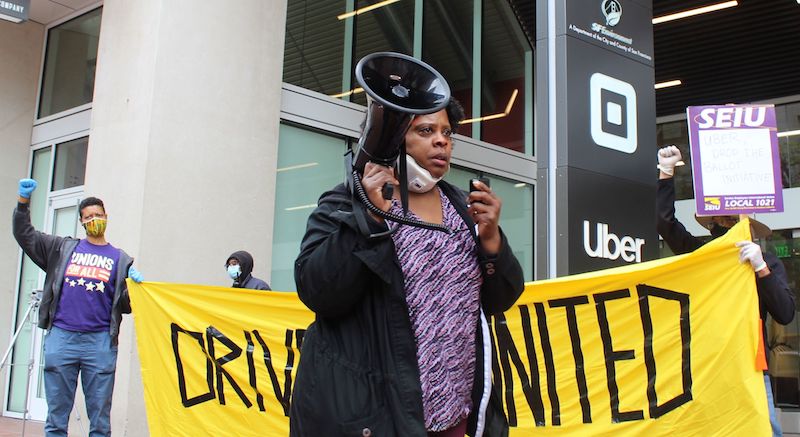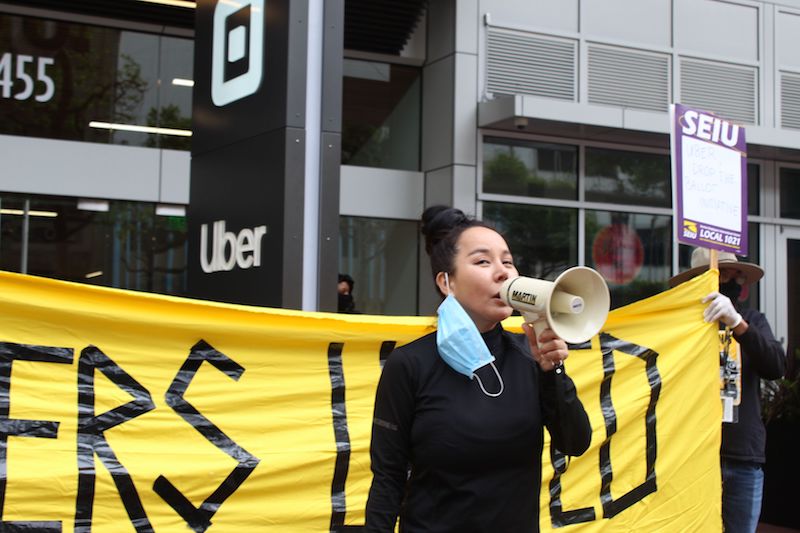SAN FRANCISCO, Calif.—Uber and Lyft’s refusal to accept the new California law intended to define their drivers as employees has had one harsh consequence. Many who lost income or have been unable to work because of the COVID-19 virus epidemic have also been unable to get unemployment benefits.

“We can’t apply for unemployment because we’re supposed to be independent contractors,” says Hector Castellanos, an Uber driver from Antioch, about 45 miles east of San Francisco.
Castellanos, a 49-year-old father of two, stopped working when California’s quarantine began March 17. His doctor advised him that “I could get a little more sick than the other person,” he says. He applied for the Pandemic Unemployment Assistance program for independent contractors when it opened six weeks later, but hasn’t received any money yet.
Uber driver Saori Okawa, a 37-year-old Japanese immigrant from San Francisco, applied for unemployment in late March, after her income dropped by half. But Uber, she says, wouldn’t give the state Employment Development Department information about her income — essential to calculate her benefits — because it insisted she’s an independent contractor. She’s appealed the denial, but hasn’t gotten approved yet.
Both were part of a caravan of several dozen vehicles that on May 11 drove from a parking lot in San Francisco’s South of Market neighborhood to Uber’s headquarters at the west end of downtown, where the company was hosting an online stockholders’ meeting. The protest, organized by We Drive Progress and Gig Workers Rising, demanded that the company drop its campaign to for a ballot initiative to repeal the new law, Assembly Bill 5, and use the money to give drivers financial support and personal protective equipment.
The law strictly limits when employers can define workers as independent contractors instead of employees and thus deny them workers’ compensation and the right to collective bargaining. Uber, Lyft, and DoorDash have so far spent $110 million on the repeal initiative — called the Protect App-Based Drivers and Services Act — according to Service Employees International Union Local 1021, which is aiding the protesting drivers.
“This company spends millions of dollars on the ballot,” says Castellanos. “They could use that money to give workers sick pay.” He knows the lack of workers’ compensation painfully well: When he was unable to work for eight months after an accident, his older daughter had to drop out of college and go to work.
Okawa switched to doing deliveries, mostly food, because business picking up passengers was too slow, and she was scared to keep doing it. “The car is an enclosed space,” she says. Personal protective gear such as masks and hand sanitizer has been “very scarce,” she adds.
“Because I juggle three apps, I manage to make a sort of livable income,” she says. She works from 7:30 in the morning to 8 at night five or six days a week, without the breaks she used to get.

Uber did not respond to questions from LaborPress, referring them to Stacey Wells, a spokesperson for Protect App-Based Drivers and Services, a coalition backing the initiative that is funded by Uber, Lyft, and DoorDash and endorsed by various law-enforcement and business organizations, several NAACP chapters, and the app-based delivery companies Instacart and Postmates.
“The drivers picketing today are in a small minority. The overwhelming majority of us who drive with these apps prefer to work as independent contractors with control and flexibility over our schedules,” semi-retired Uber driver Jim Pyatt said in a statement provided by Wells.
The coalition argues that classifying drivers as employees “would result in the loss of hundreds of thousands of jobs and the loss of app-based delivery services that millions are relying on.” Its initiative would require companies to give drivers a minimum wage for the time they have a fare or are on their way to pick one up, as well as subsidies for buying health insurance. However, it specifies: “Independent contractors are not entitled to certain state-law protections afforded employees — including minimum wage, overtime, unemployment insurance, and workers’ compensation.”
A study released this month by the University of California’s Institute for Research on Labor and Employment estimated that if Uber and Lyft had treated workers as employees, they “would have paid $413 million into the state’s Unemployment Insurance Fund between 2014 and 2019.”
“We need to be employees,” says Castellanos. “They’re not cheating just drivers. They’re cheating the taxpayers.”
On May 5, state Attorney General Xavier Becerra and the city attorneys of Los Angeles, San Diego, and San Francisco sued Uber and Lyft for misclassifying their drivers as independent contractors in ways illegal under Assembly Bill 5. “Misclassification harms workers by depriving them of basic labor standards and employee social safety net protections that serve as lifelines during times of social and economic crisis,” Becerra’s office said in a statement. “And misclassification hurts taxpayers because taxpayers carry the load for funding social safety net services that out-of-luck workers without protections turn to in times of need.”
The situation is dire for drivers who’ve lost income and don’t have that safety net, according to two surveys conducted in April. One, of about 1,100 drivers by We Drive Progress and the Mobile Workers Alliance, found that 67% of respondents said is was unlikely they’d be able to pay their rent or mortgage for May, 26% had no health insurance, and 68% said the company they work for does not provide protective equipment such as masks, gloves, and sanitizing products.
The other, by the University of California at Santa Cruz, said 37% of respondents had lost all their income in the epidemic, 19% had lost more than three-fourths of it, and 28% were still accepting jobs despite fear of being infected because they needed the money. It said more than two-thirds of drivers worked at least 30 hours a week for platform-based companies, with 30% working more than 50 hours.
Okawa says that as an immigrant, she was really glad the protest happened. “A lot of times we think that because our English is not as good as Americans’, we didn’t know we could ask for change and better conditions,” she told LaborPress.



